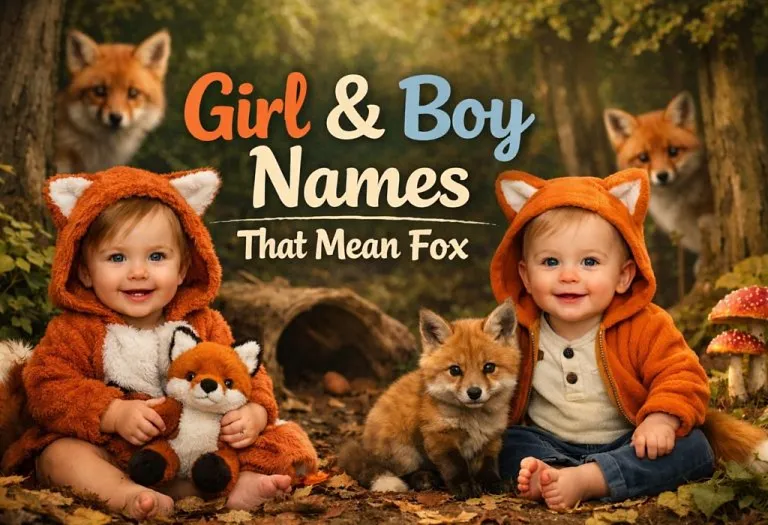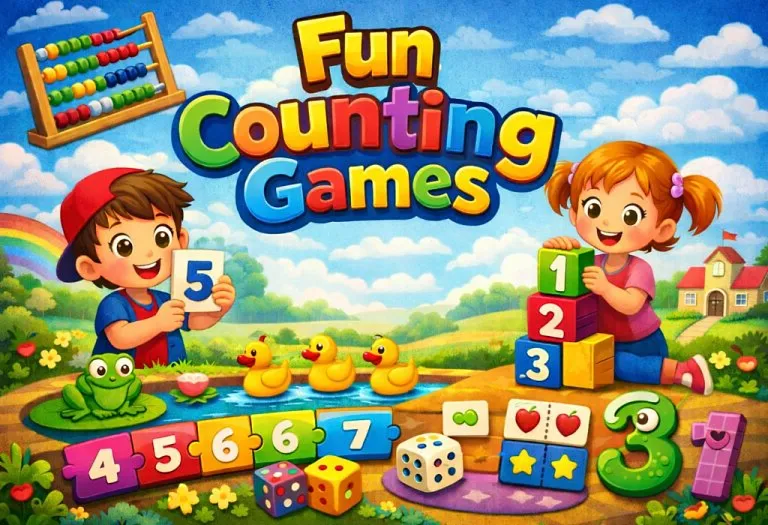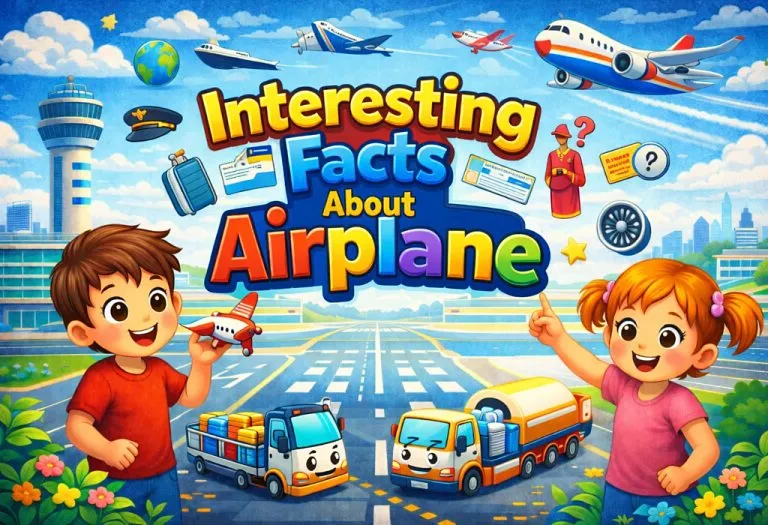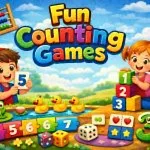Speech on Diwali In English For Students and Children
- 10 Lines Speech On Diwali
- Motivational Speech On Diwali
- 1 Minute Speech on Diwali
- 2 Minute Speech On Diwali
- 3 Minute Speech on Diwali
- 5 Minute Speech on Diwali
- Short Speech on Diwali
- Long Speech on Diwali Festival
- Tips To Keep In Mind While Presenting Speech On Diwali
- FAQs
Are you looking for the perfect Speech on Diwali? This article is here to help children and students prepare an impressive speech on Diwali, the festival of lights. Whether you need a short and long speech on Diwali for a school event, competition, or class presentation, we provide a variety of sample speeches to choose from. Also known as Deepavali, this festival celebrates the triumph of light over darkness and good over evil, and is filled with vibrant traditions and joyous celebrations.
Our collection of Diwali speech in English for children and students covers the history, cultural significance, and customs of this special festival, making it easy for young speakers to connect with their audience. These speeches are thoughtfully crafted to help you share the true spirit of Diwali with confidence.
Explore the article to find the ideal Deepavali speech and make your presentation memorable and inspiring for everyone!
10 Lines Speech On Diwali
This Diwali speech for class 1 and 2 will help you understand the festival and why we celebrate it with joy and lights. Lets present the speech on diwali in 10 lines.
- Diwali is a festival of lights celebrated by people all over India.
- It marks the victory of good over evil and light over darkness.
- During Diwali, we decorate our homes with diyas and colorful rangolis.
- We wear new clothes and exchange sweets and gifts with our friends and family.
- The story of Lord Ram returning to Ayodhya after defeating Ravana is told during this time.
- Fireworks light up the sky, making Diwali a joyful and exciting festival for everyone.
- Diwali teaches us the importance of kindness, sharing, and togetherness.
- We clean our homes to welcome Goddess Lakshmi, who brings wealth and prosperity.
- It’s also a time to pray for peace and happiness in everyone’s lives.
- Diwali is my favorite festival because it fills our hearts with happiness and hope.
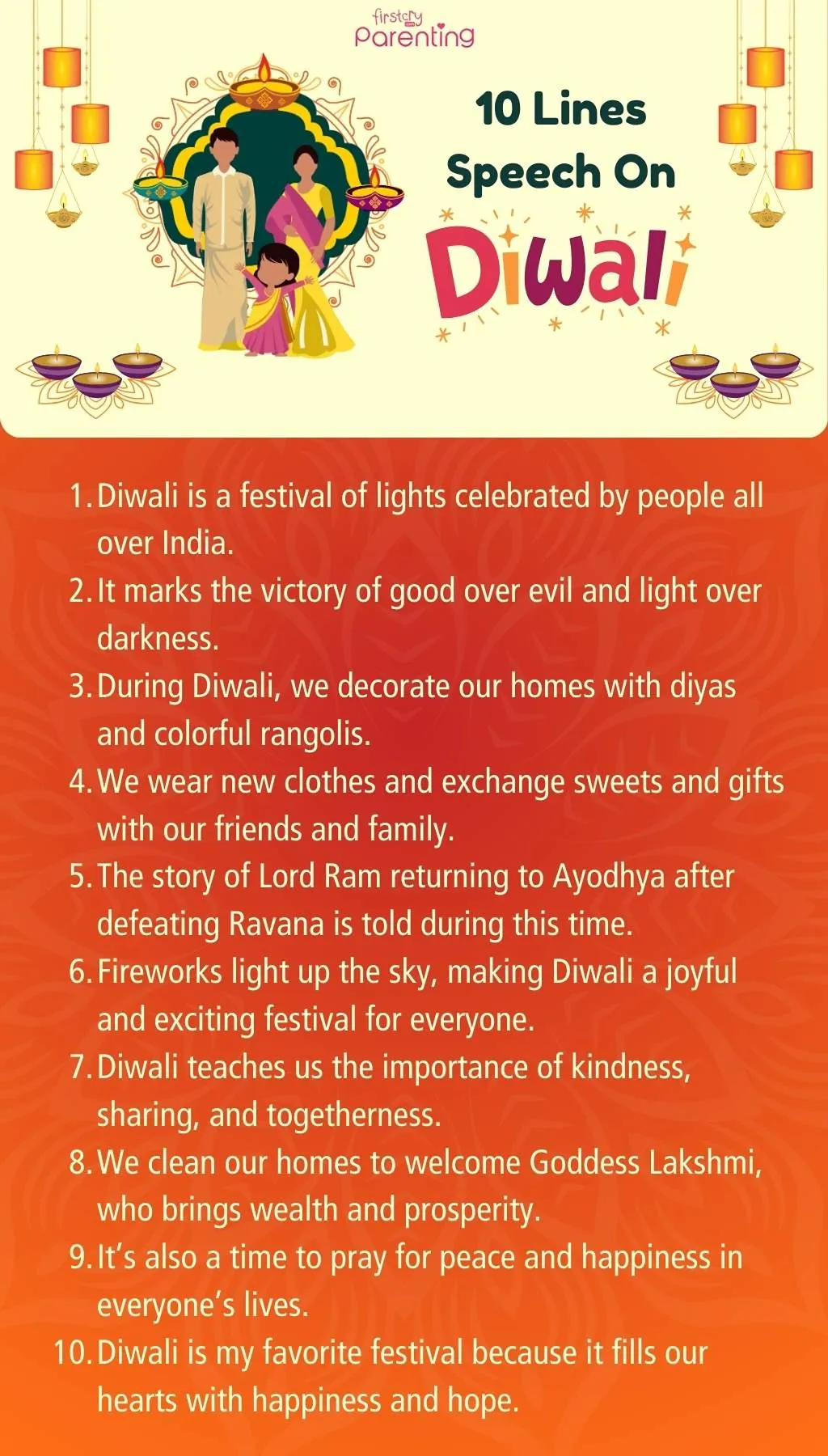
Motivational Speech On Diwali
Here you will find inspiring or motivational speech on diwali which help students to explaining about diwali in briefly.
Today, I want to share a motivational speech on Diwali. Diwali is not just a festival of lights; it’s a reminder of the power of good thoughts and actions. The story of Diwali teaches us to face challenges with courage and confidence. Whether it’s a difficult exam, a new skill you’re trying to learn, or even being kind to others, Diwali reminds us to stay focused and keep moving forward. Just as Lord Ram returned to his kingdom after a long battle, we, too, can achieve our goals by working hard and never giving up.
Diwali holds an important message that no matter how tough situations get, we can always overcome them by staying positive, just like how light defeats darkness.
Diwali also inspires us to share happiness with others, help those in need, and be a source of light in someone’s life. So, let’s take the spirit of Diwali into our hearts and be the best versions of ourselves every day.
Thank you!
1 Minute Speech on Diwali
Diwali is a festival of lights where children and families come together to celebrate joy, kindness, and the victory of good over evil. It’s a time to spread happiness and brightness in our homes and hearts.
Good morning everyone,
Today, I’d like to share a one-minute speech on Diwali. Diwali, also known as the Festival of Lights, is a celebration of the triumph of good over evil and light over darkness. It marks the return of Lord Ram to Ayodhya after defeating Ravana. During this festival, homes are decorated with diyas, rangolis, and lights, while families come together to share sweets and exchange gifts.
Diwali also carries an important message of kindness, unity, and hope. It reminds us to spread positivity and be compassionate towards others. By celebrating Diwali, we not only enjoy the festivities but also reflect on our actions and embrace new beginnings with a positive outlook.
Thank you!
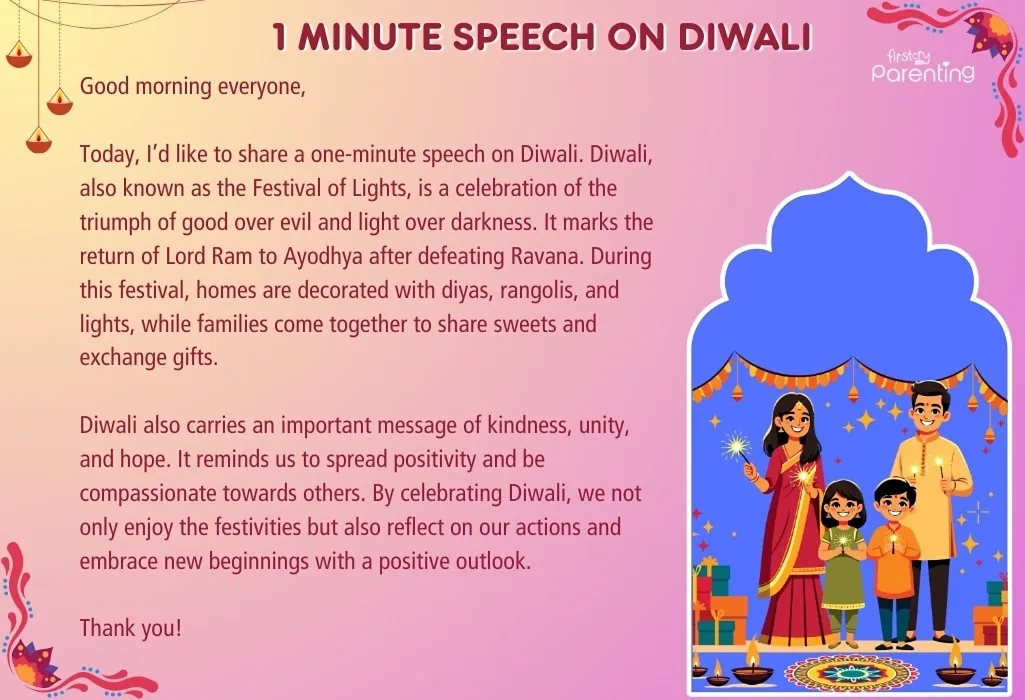
2 Minute Speech On Diwali
Let’s take a moment to understand why Diwali holds such a special place in our culture. Here students will get 2-minute speech on Diwali, a festival that brings with it meaningful traditions and lessons.
Good morning everyone,
Today, I am excited to share my thoughts on Diwali, one of the most important festivals in India.Diwali is more than just a time to enjoy sweets and fireworks—it teaches us valuable life lessons.The story of Diwali reminds us that no matter how challenging the situation may be, good always prevails over evil. Diwali is a time of celebration, where families come together to observe traditions that have been passed down for generations.Diwali also teaches us the importance of kindness and sharing. It’s a time when we come together to celebrate with our family. Small acts of kindness, like helping someone or sharing what we have, can make a big difference.
Diwali encourages us to look forward with hope and positivity. It’s a time to reflect on the past year and start fresh.As we celebrate Diwali, let’s embrace its true meaning by being kind, courageous, and positive. Remember, every small action of goodness can light up someone’s world, just like the diyas we light during Diwali.
3 Minute Speech on Diwali
Let’s take a deeper look into why Diwali is more than just celebrations and what it truly represents for our lives through this diwali festival speech.
Good morning everyone,
Today, I am excited to present a 3-minute speech on Diwali, a festival celebrated with much enthusiasm across India. Diwali is observed on the new moon day in the month of Kartika, which usually falls between October and November. It marks the beginning of a new season and holds immense cultural significance for people of all ages.
Diwali is widely known for the story of Lord Ram’s return to Ayodhya after defeating Ravana, but another important aspect of Diwali is the story of Lord Krishna. According to legend, Lord Krishna defeated the demon Narakasura, who had captured thousands of innocent people. His victory brought freedom to the people, and the day was celebrated with lights and joy. This story teaches us the importance of courage and fighting against injustice, no matter how powerful the obstacles seem.
Diwali is celebrated over five days, each with its own significance. The first day is Dhanteras, where people buy new items, symbolizing prosperity. The main day of Diwali is filled with lighting diyas, decorating homes, and offering prayers to Goddess Lakshmi for wealth and good fortune.
Diwali is a time to reflect on values such as kindness, bravery, and togetherness. Beyond the festivities, it is a reminder of how we can make a positive impact on others through our actions. As we light diyas, it’s also a moment to brighten our thoughts and approach the future with hope and positivity.
Let’s all celebrate Diwali by embracing the lessons it teaches us and spreading happiness wherever we go.
Thank you!
5 Minute Speech on Diwali
In this 5-minute speech on Diwali, you will learn about the celebration that not only brings families together but also carries important lessons for all of us.
Good [morning/afternoon/evening] everyone!
Today, I am here to talk about one of the most vibrant and joyous festivals in India – Diwali, also known as the Festival of Lights. Diwali is not just a single-day celebration but a five-day celebration that symbolizes the victory of light over darkness, good over evil, and knowledge over ignorance.
Diwali is celebrated every year in the Hindu month of Kartik, which usually falls in October or November. The five days of Diwali are each marked by unique traditions and rituals, and they tell a beautiful story of Indian culture and beliefs.
- The First Day of Diwali : Dhanteras The festival begins with Dhanteras, a day that signifies the start of Diwali. The word ‘Dhan’ means wealth, and ‘Teras’ refers to the 13th day of the lunar fortnight. On this day, people worship Lord Dhanvantari, the god of health and Ayurveda, as well as Goddess Lakshmi, the goddess of wealth. It is believed that buying gold, silver, or utensils on Dhanteras brings prosperity and good fortune to the household. People clean and decorate their homes, creating a fresh and welcoming atmosphere for the festive days to come.
- The Second Day of Naraka Chaturdashi or Choti Diwali : According to Hindu mythology, on this day, Lord Krishna defeated the demon king Narakasura, freeing the world from his terror. The day is marked by the lighting of oil lamps, bursting of crackers, and the decoration of homes with rangoli designs. People also wake up early to take an oil bath, a ritual believed to cleanse the body and soul. This day sets the stage for the grand celebrations that follow.
- The Third Day of Diwali : The third day is the main day of Diwali, the most awaited part of the festival. On this day, people worship Goddess Lakshmi, seeking her blessings for wealth, prosperity, and happiness. The ritual, known as Lakshmi Puja, is performed in the evening, where families gather to light earthen lamps, candles, and diyas. Homes are decorated with colorful lights, flowers, and rangoli, and the night sky is filled with the sparkle of fireworks. This day symbolizes the return of Lord Rama to Ayodhya after 14 years of exile and his victory over the demon king Ravana. People rejoice by sharing sweets, gifts, and warm wishes, making Diwali a truly magical experience.
- The Fourth Day of Govardhan Puja or Annakut : The fourth day is celebrated as Govardhan Puja in many parts of India, especially in the northern states. It commemorates the day when Lord Krishna lifted the Govardhan Hill to protect the people of Vrindavan from a torrential rainstorm caused by Lord Indra. On this day, people prepare a variety of dishes and offer them to Lord Krishna, symbolizing gratitude and abundance. In some regions, this day is also known as Annakut, meaning a mountain of food, and communities come together to enjoy feasts.
- The Fifth Day of Bhai Dooj : The fifth and final day of Diwali is Bhai Dooj, a day dedicated to the bond between brothers and sisters. On this day, sisters pray for their brothers’ well-being, success, and longevity by performing a special ritual. In return, brothers promise to protect and support their sisters throughout their lives. This day strengthens family ties, bringing a beautiful end to the Diwali festivities.
Diwali is much more than just a festival; it is a celebration of life, light, and love. It teaches us to embrace the good in ourselves and others, to spread positivity, and to cherish the blessings we have. So, as we light our lamps this Diwali, let’s light up not just our homes but also our hearts with love and kindness.
Thank you, and wishing you all a very happy and prosperous Diwali!
Short Speech on Diwali
Diwali is a momentous occasion that brings together families and friends to celebrate with warmth and tradition. Here you will get idea to write short speech on Diwali in English for class 3 and other primary classes.
Good morning everyone,
I am excited to give a short speech on Diwali today. Diwali, also known as the Festival of Lights, is celebrated by millions across the world. It celebrates the return of Lord Ram to Ayodhya after defeating Ravana, symbolizing the victory of good over evil. During Diwali, homes are beautifully decorated with diyas, candles, and rangolis. Families gather to exchange sweets, wear new clothes, and offer prayers to Goddess Lakshmi for prosperity and wealth.
Diwali is a time to learn about our culture, values, importance of kindness and helping others. The lighting of diyas reminds us to spread positivity and hope in our lives. Diwali is a time for good things in life, being thankful, and fostering a sense of gratitude and reflection.
This speech helps you to understand the meaning of Diwali. Let’s celebrate this special day with happiness and love.
Thank you!
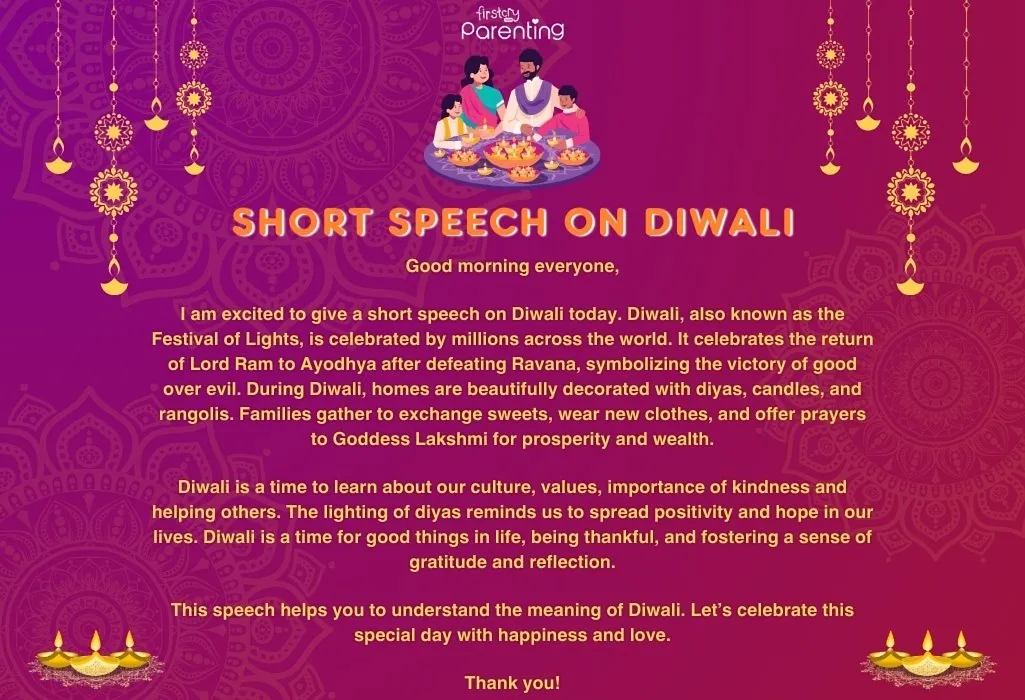
Long Speech on Diwali Festival
Here children will get detailed speech on Diwali celebration to understand why this festival holds great cultural and spiritual significance.
Good morning respected teachers and my dear friends,
Today, I am honored to give speech about diwali festival,which is one of the most important and celebrated festival in India. Diwali, also known as Deepavali, means “row of lamps.” It is a five-day festival that celebrates the triumph of light over darkness and good over evil. The festival is deeply connected to the return of Lord Ram to Ayodhya after 14 years of exile, following his victory over the demon king Ravana. To celebrate his return, the people of Ayodhya lit oil lamps across the city, which is why we light diyas during Diwali even today.
In preparation for Diwali, families clean and decorate their homes with colorful rangolis and lights. The festive spirit begins with Dhanteras, the first day, when people buy new items, particularly gold and utensils, as a sign of good fortune. The main day of Diwali is marked by Lakshmi Puja, where prayers are offered to Goddess Lakshmi for health, wealth, and prosperity. The night is illuminated with diyas, and fireworks fill the sky, symbolizing the banishment of evil and darkness.
Diwali is a time of great excitement. We enjoy wearing new clothes, bursting crackers, and eating delicious sweets like laddoos, barfis, and gulab jamuns. But beyond the fun, Diwali teaches us many important lessons. It encourages us to spread positivity, kindness, and compassion towards others. It is also a reminder to let go of any negativity in our lives and start fresh with good intentions.
Thank You!
Tips To Keep In Mind While Presenting Speech On Diwali
To make a Diwali speech engaging and enjoyable, kids need to be well-prepared and comfortable.Here are some simple tips to help them deliver their speech confidently and clearly
- Begin your speech with a warm smile. It will help you feel more confident and make the audience feel welcome and engaged.
- Practice your speech several times before the actual presentation. This will help you remember the key points and deliver them smoothly.
- Don’t rush through your speech; take your time to pronounce each word clearly.
- Try to look at your audience while speaking. Making eye contact helps connect with listeners and shows confidence.
- Use words that are easy for everyone to understand, especially if your audience includes other kids. Avoid using too many difficult words.
- If possible, include a personal story or experience related to Diwali. It will make your speech more interesting and relatable.
- Feel free to use hand gestures and facial expressions to add more emotion to your speech.
- Begin your speech by greeting the audience and wishing them a happy Diwali. End with a thank you and another warm Diwali wish.
- Make sure your speech is not too long. A short and sweet message will keep the audience’s attention and make your speech memorable.
- Take a deep breath and stay calm. Remember that it’s okay to make a mistake; just keep going.
FAQs
1. What is the best way to start a Diwali speech?
Start your Diwali speech with a warm greeting, like “Good morning everyone” or “Happy Diwali to all.” You can also begin with a simple statement about the festival, such as, “Diwali is a festival of lights that brings joy and happiness to everyone.
2. What should I do if I forget my lines during the speech?
If you forget your lines, take a deep breath and pause for a moment. Try to remember the next point or summarize it in your own words. It’s okay to make mistakes; just keep going and stay confident.
These dipavali speeches cover the festival’s significance, history, and the traditions that make Diwali special, providing a comprehensive guide for crafting a meaningful speech. With these examples, young speakers can confidently convey the true spirit of Diwali, highlighting the celebration of light over darkness and good over evil. We hope these speeches inspire you to share the joy and cultural importance of Diwali, making your presentation both memorable and impactful.
Also Read:
Essay on Diwali for Children
Facts about Diwali for Kids
Diwali Safety Tips for Kids
Was This Article Helpful?
Parenting is a huge responsibility, for you as a caregiver, but also for us as a parenting content platform. We understand that and take our responsibility of creating credible content seriously. FirstCry Parenting articles are written and published only after extensive research using factually sound references to deliver quality content that is accurate, validated by experts, and completely reliable. To understand how we go about creating content that is credible, read our editorial policy here.






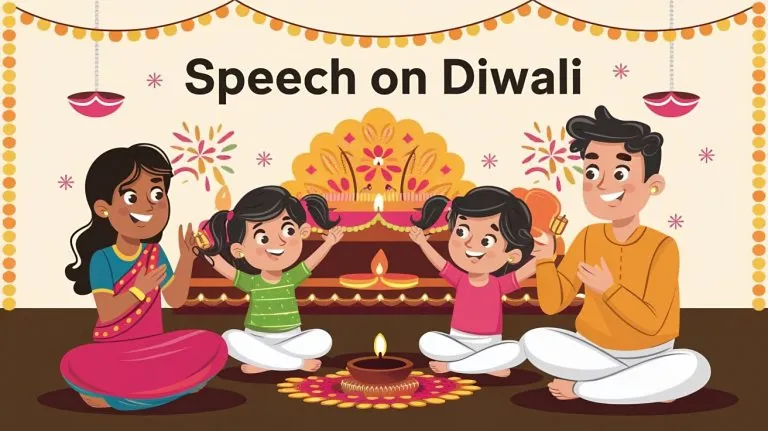
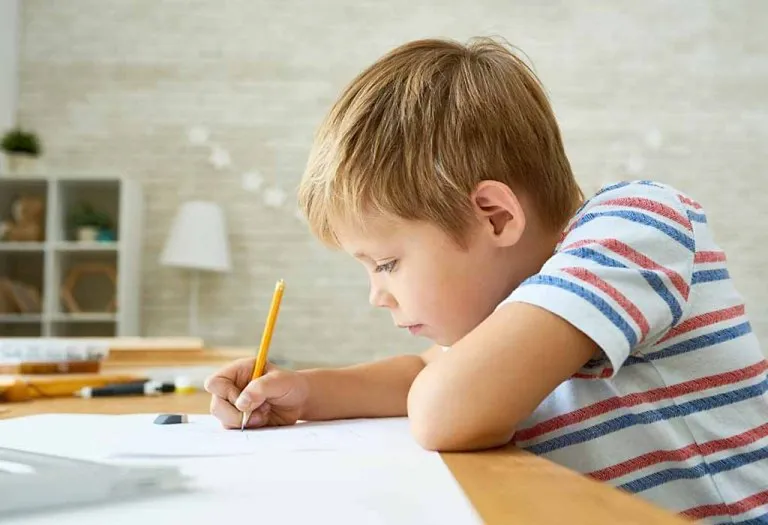

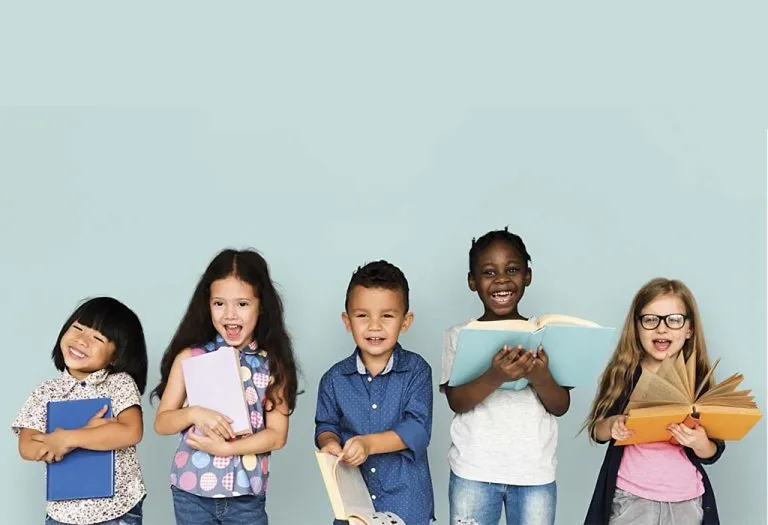
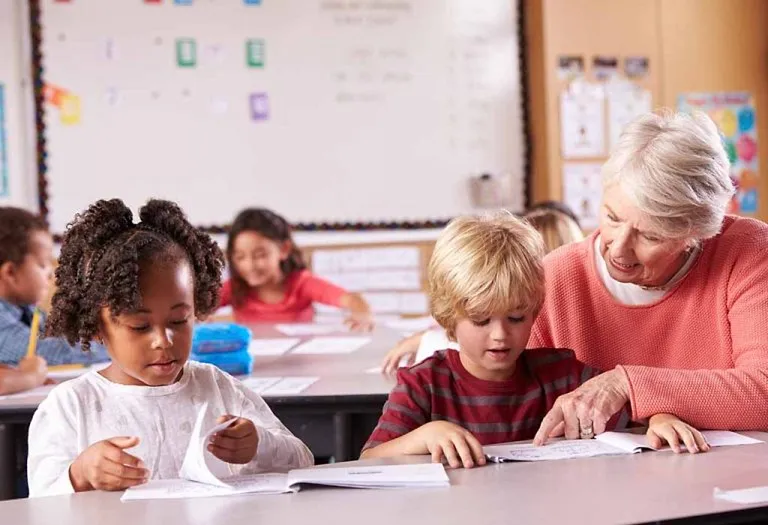
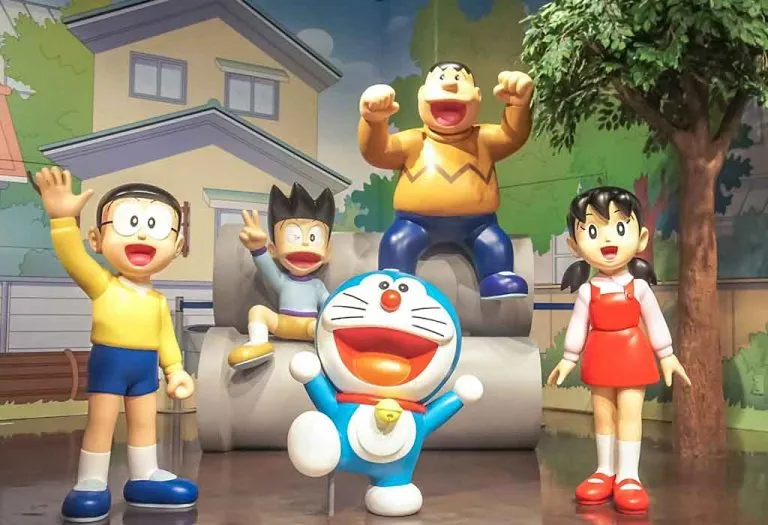
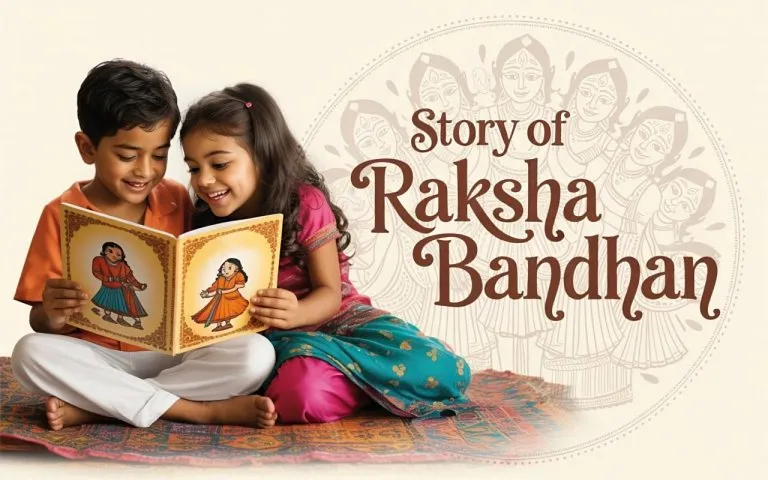

.svg)






